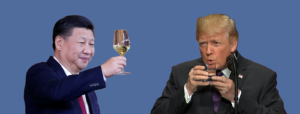A stimulus buffet and the musicians on the Titanic

Stereophonics, a British band, have played multiple show dates in the U.K. in recent days, while the rest of the world looks on in disbelief. (See “Around the world” section below.)
You should try stimulus, everyone else is doing it
The world is dealing with a new reality: The bottom has fallen out of the global economy. No one knows how bad the damage will be.
Economists are predicting that China will have experienced its first outright economic contraction since 1976, the first year records began being kept. Projections for the U.S. are no better. With China and the U.S. on the ropes and Europe already teetering on the brink of recession before the pandemic, few countries look capable of escaping untouched.
And so in the past days there has been an unprecedented wave of economic stimulus packages announced by governments all around the world.
Where the stimulus responses to the financial crisis of 2008 were measured in tens or hundreds of billions of dollars, this time we’re talking trillions.
The U.S. leads the way
The United States — the world’s largest economy — announced a stimulus plan of more than $1 trillion dollars.
Our thought for the day: Both houses and parties of congress have come together with the White House to pass enormous and critical legislation at record speed. When they believe in and care about something, they can do it. Perhaps the environment, technology and data privacy, and other critical issues may get some overdue attention after COVID-19 passes.
Some of the details:
- Trump announced two separate $250 billion rounds of cash stimulus that would be sent directly to U.S. taxpayers.
- The Treasury department will provide detailed guidelines on how this will be done. There has been mention of making the amount of money received tiered based on income level and family size.
- Congress is looking set to pass a separate act that would provide free virus testing to anyone in the U.S., paid emergency sick leave for those who don’t already have it, food security funds, and increased funding for Medicaid.
- Funds were outlined for specific industries that are being hit particularly hard. $50 billion for the airline industry and $150 billion for “severely distressed sectors.” This money would come as a range of cash, loan guarantees, or new loans.
- There would be a separate $300 billion fund set up for “small business continuity” to help small businesses across the country weather the storm.
Other countries aren’t far behind
Most countries in the world are doing something to combat the economic impact of the virus. Below are some key highlights (see this page from finance industry website Investopedia for more).
- The IMF is preparing up to $1 trillion in relief for various smaller nations that may not be able to marshal their own resources.
- China — the world’s second-largest economy — has been notably silent on large stimulus measures. While in 2008 it responded more ferociously than any other country including the U.S. and is even credited by some with having “saved the world economy” at that time, they appear to be waiting or abstaining altogether this time, despite their economy being in its worst economic contraction since modern record keeping began in 1976. (FT)
- Japan — the world’s third-largest economy — has offered $15 billion of aid direct to individuals and, more importantly in a country with the highest corporate debt to GDP ratio in the world, a large program to buy corporate debt and issue new corporate loans. With a comparatively limited outbreak crisis and a very high level of household savings, it is possible that the Japanese government is holding back the bigger guns for harder times that may be yet to come.
- European nations are doing whatever it takes to reassure people that their economies will not fail. Just this morning, Christine Lagarde, the President of the European Central Bank, pledged no upper limits to facilities that will be made available to keep the European Union afloat.
- France has said that “no company will be allowed to fail because of the coronavirus disease.” Few details have been provided as to how that will be achieved. (CNN)
- Germany’s normally tight-lipped finance minister announced a week ago that “there is no upper limit on the amount of loans the KfW [the nation’s development bank] can issue” and “this is the bazooka and we will use it to do whatever it takes.” Over EUR 500 billion ($539.8 billion) is already available, and it was said that “this is just the beginning.” (FT)
- Italy has banned companies from laying off workers and has mandated that rents should be reduced. (Channel News Asia)
- Spain announced a EUR 200 billion plan of its own. (Politico)
- In the U.K., the government has backed $400 billion in loans to companies and mortgage lenders have agreed to delay payments for three months. (CNN)
- Australia $15 billion “for sectors bearing the brunt of the economic shock…including airlines, tourism, events, sport and the arts.”
- Turkey $15 billion aiming”to protect small businesses, exporters, employees and pensioners.”
- Canada $82 billion “in direct aid and deferred tax payments for individuals and businesses..”
What happens after social distancing is over?
China entered the coronavirus crisis months before the rest of the world, reporting its first cases to the World Health Organization on December 31, 2019. They enacted severe countermeasures that essentially shut down all travel, movement, commerce, and civic society in large swaths of the country of 1.4 billion people. At the time, some critics said the measures were “authoritarian” and overly draconian. Now, most Western nations have been forced to follow suit as they face their own coronavirus epidemics. From California to New York to London to Berlin — “shelter in place” orders have either been given or are pending any day.
Just as it entered the crisis earlier, so too will China attempt to come out of it earlier.
Today, China announced that it has no new domestic cases of COVID-19. They did report about 40 new cases, but all can be traced directly to people who recently traveled in other countries — none were the result of community spread within China. Note: numbers from the Chinese government should be treated with caution.
This will be a moment of truth not just for China, but for the world. Experts are watching closely to see if there is a “second wave” of infections after social distancing measures are eased and people attempt to return to normal life.
U.S. updates
Grocery store workers have featured prominently in people’s minds as they continue to work every day, and in environments with high exposure to large numbers of people. BuzzFeed looks at the realities of their current day to day situation.
The first two members of congress to contract the virus are from Florida and Utah. While they may be the first politicians in the U.S. to contract the disease, they are now in the company of dozens of prominent politicians around the world who have been diagnosed with COVID-19.
U.S. armed forces have begun to see concentrated outbreaks among their populations. (Navy Times, Military.com)
There is growing concern that outbreaks in U.S. prisons could be a true nightmare scenario, as the prison system is overpopulated and under-resourced, particularly in regards to healthcare. (CNN)
Trump has implemented a Cold-War-era law called the Defense Production Act, which would allow the federal government to direct industrial production to ensure there are no shortages of critical materials and products to battle the pandemic. But he tweeted earlier in the day that he would only use the new powers “in a worst case scenario”. (NPR)
Immigration and Customs Enforcement (ICE) has said it will only make “mission critical” arrests during the COVID-19 crisis (i.e. it will go easier on enforcement). (NYT)
Around the world
- Doctors in England are “frightened” about their under-resourced system’s ability to handle the pending tidal wave of COVID-19 patients. Meanwhile, a concert of tens of thousands of people played on.
- Singapore has shown a growing number of cases, despite its early success in battling the disease. Its numbers still rank as some of the best (i.e. lowest) in the world. (Channel News Asia)
- Africa has so far fared pretty well against the coronavirus. Some point out that this may not be a fluke, as the continent has a lot of counter-outbreak infrastructure leftover from the ebola crisis of 2014. Others point out that the situation could turn on a dime and there is no cause for celebration. (The Intercept)
Cure and vaccine radar
The Milken Institute has launched a tracker focused solely on all the potential vaccines and cures for COVID-19. Check it out here, and check back regularly if this topic interests you. (We’ll also bring updates to you here!)
- Japanese flu drug ‘clearly effective’ in treating coronavirus, says China (The Guardian)
- WHO announces global trial to study coronavirus treatments (The Hill)
- A promising treatment for coronavirus fails (NYT)






